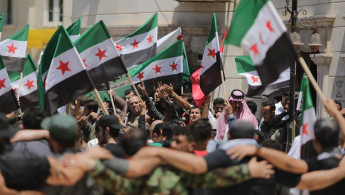HTS pull out of military convoy after protests in northwest Syria
Rival opposition militias in northwest Syria made amendments on Sunday to a preliminary ceasefire agreement, which sparked widespread protests across rebel territories.
Hardline Islamist extremist group Hayaat Tahrir al-Sham (HTS) backtracked on its plans to conduct a military convoy in areas controlled by factions of the Turkish-backed Syrian National Army (SNA) in the northern province of Aleppo.
The decision was made after activists protested in over 15 areas across the region, including Al-Bab, Afrin, Jarabulus, Azaz and Marea, blocking roads to prevent HTS from passing through. Activists called for new demonstrations on Monday and a strike.
It comes after clashes between HTS and elements of the former Free Syrian Army (FSA) after the extremist group marched into opposition territories.
ياجولاني اسمع منا هزمناك بـ #كفرجنة من مدينة #اعزاز الحرة pic.twitter.com/VyQVt8lFWU
— قاسم الجاموس أبو وطن (@Kasem_Jamous) October 17, 2022
During negotiations between HTS and the 3rd Corps faction of the SNA on Friday night, it was agreed that areas surrounding Afrin and Azaz would come under a unified military administration supervised by HTS, a military source from the SNA division told The New Arab’s Arabic-language service Al-Araby Al-Jadeed.
The agreement also stipulated the entry of a HTS military convoy in Azaz and other cities, as a symbolic sign to encourage acceptance of their presence in these areas.
HTS has been widely opposed by activists and locals in anti-Assad areas of Syria, due to the group's harsh crackdowns and autocratic approach in dealing with criticism.
HTS, which emerged from Al-Qaeda's Syrian franchise, is classified as a terrorist organisation by the US, UK and Turkey. Abu Mohammed Al-Jolani has formally cut ties with Al-Qaeda but the militant group remains distrusted by Syrians and neighbouring countries.
Residents fear that if the faction enters areas controlled by the Syrian opposition, it may constitute a pretext for the Russians and the regime to again shell and bomb residential areas, displaced civilian Abu Ali al-Shami told Al-Araby Al-Jadeed.
Al-Shami stated it "could be the beginning" of such assaults, with Russian planes bombarding the outskirts of Azaz city on Sunday.
Russian warplanes also bombed on Sunday a camp belonging to the Suqour Al-Sham faction near the town of Qatmah, in between Azaz and Afrin, along with the southern Idlib countryside, Al-Araby Al-Jadeed reported.
About four million people live in rebel-held areas of Syria, many of them displaced from elsewhere in the country by the war that began in 2011 after Bashar al-Assad's regime crushed peaceful protest.
The Syrian rebels are fragmented into a myriad of different groups, with HTS dominating most of the Idlib province, while Turkish-backed groups control Azaz, Al-Bab and other cities near the Syrian-Turkish border.





 Follow the Middle East's top stories in English at The New Arab on Google News
Follow the Middle East's top stories in English at The New Arab on Google News


![MP Essam Diab's pursuit to block TikTok in Egypt has revived an already ongoing debate in the country. [Getty]](/sites/default/files/styles/image_330x185/public/1230748046.jpeg?h=a5f2f23a&itok=-8MqBLLC)